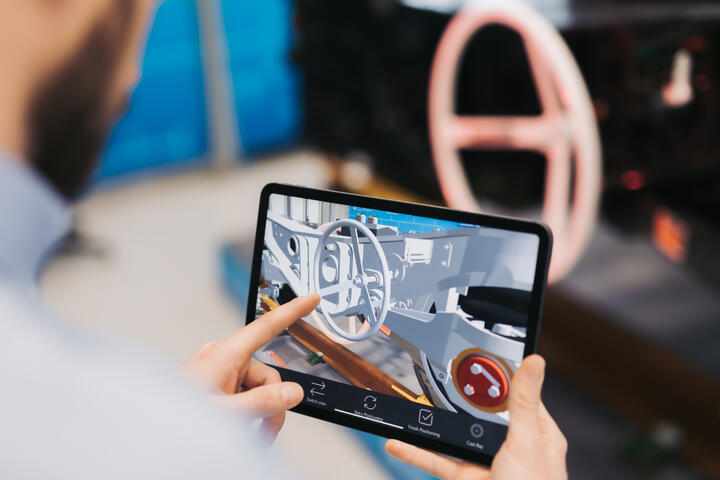Digital thread: A glimpse into the future of manufacturing
03 April 2024What is the digital thread and how can it help untangle the complexities of manufacturing and benefit the industry? Professor Ben Morgan, research director at the AMRC, explains.
The University of Sheffield Advanced Manufacturing Research Centre (AMRC) has always been at the forefront of manufacturing innovation. From our 5G Factory of the Future and open-source reference framework Factory+, to untangling the requirements of the digital twin, we have demonstrated and integrated pioneering digital technologies to maximise growth for manufacturing companies and wider UK industry.
For more than two decades, we have collaborated with industry leaders to push the boundaries of what’s possible, developed cutting-edge technologies and brought groundbreaking products to life.
But the manufacturing landscape is shifting.
Products are becoming ever more complex, with intricate systems and tightly coupled components. Imagine a modern jet engine – tens of thousands of intricately connected parts working in harmony together with tight tolerances and incredible precision. A seemingly minor adjustment to one component could have cascading effects throughout the entire system, potentially leading to unintended consequences, or even a catastrophic failure.
Furthermore, we rely on a document-centric approach. Traditionally, engineers have worked in silos, generating mountains of paperwork – 2D drawings, specifications and CAD models shared across dozens of departments. This fragmented system adds to the difficulty of understanding the intricate relationships between components and assemblies.
This is the challenge of complexity and it's only going to become more prevalent as high-value products in highly-regulated sectors such as aerospace, maritime, medicine and nuclear become more sophisticated. To tackle this, we need a paradigm shift – a new way to capture requirements, design, develop and manufacture in this era of ever-increasing complexity.
So, how do we do this?
Digital thread is an emerging technology area driven in many instances by a model-based systems engineering (MBSE) approach. It offers a single source of truth that connects everything from the initial concept design to manufacture, all the way through to a product's end-of-life.
The AMRC has a proven track record of translating innovation into production, and is the one place in the UK where a multitude of core capabilities, skills and expertise merge to provide a world-class testbed for something as extensive as a digital thread. This has led to a significant industrial demand for the AMRC to de-risk and develop the technology area, and ease its widespread adoption across the manufacturing ecosystem – making it a key focus of our research and development strategy.
In the coming years, the digital thread will be key to understanding these intricate relationships, capturing every aspect of a product lifecycle and allowing everyone involved – from design engineers and manufacturing engineers, to supply chain partners and end customers – to access and update information in real-time. This central platform will foster seamless collaboration and promote concurrent engineering, ensuring everyone is on the same page from the outset.
The digital thread is a game-changer – not just for discrete production systems, but for entire business enterprises. The advantages of digital thread are far-reaching and include:
- Faster time to market: Streamlined collaboration and clear communication through one common digital model will significantly reduce the time it takes to bring new products to market.
- Reduced risk: The ‘system of systems’ approach will allow us to simulate the impact of changes within the digital model, to help identify and address potential problems before they occur in the real world, saving time, money and resources – supporting mitigation of risks.
- Improved efficiency: Imagine a system that automatically optimises parts for better performance and higher output. With digital thread, capturing data throughout the entire product lifecycle will be possible – which in turn will facilitate a feedback loop, leading to more efficient and cost-effective products.
- Accurate carbon accounting for sustainability credentials: While it’s relatively easy for manufacturers to understand the scope 1 and 2 emissions they create within their businesses, it’s harder to get a handle on the scope 3 emissions in their upstream and downstream supply chains. Accurate data captured using digital thread will allow manufacturers to track the carbon footprint of a product they are using through the supply chain in an interoperable and standardised way – empowering them to make informed decisions about materials and processes, reducing environmental impact.
- Improved supply chain connectivity: The digital thread will help provide assurance, traceability, wider transparency and adaptability – offering an advanced opportunity to supply chain members to be able to open new business models with better availability and flexibility.
By recognising the many benefits of this emerging technology and developing and testing the limits of possibility, the AMRC is leading the way in de-risking and implementing the digital thread. At the MACH 2024 exhibition, the AMRC team demonstrated the foundations of a digital thread at scale using an uncrewed aerial vehicle (UAV) concept – a complex manufacturing assembly.
The UAV concept highlights how different manufacturing capabilities like design, composite manufacturing, digital manufacturing, castings, subtractive manufacturing and assurance can seamlessly interact through a common model. The UAV itself is just a ‘wrapper’ – the true power lies in the underlying digital thread framework that connects through its lifecycle.
The future of manufacturing is digital, and the digital thread is a key technology driving this transformation – where complexity is not a barrier, but a springboard for innovation. A steep learning-curve to untangle the digital thread lies ahead of us – in order to build a more innovative, sustainable and prosperous manufacturing industry in the UK, and beyond.

